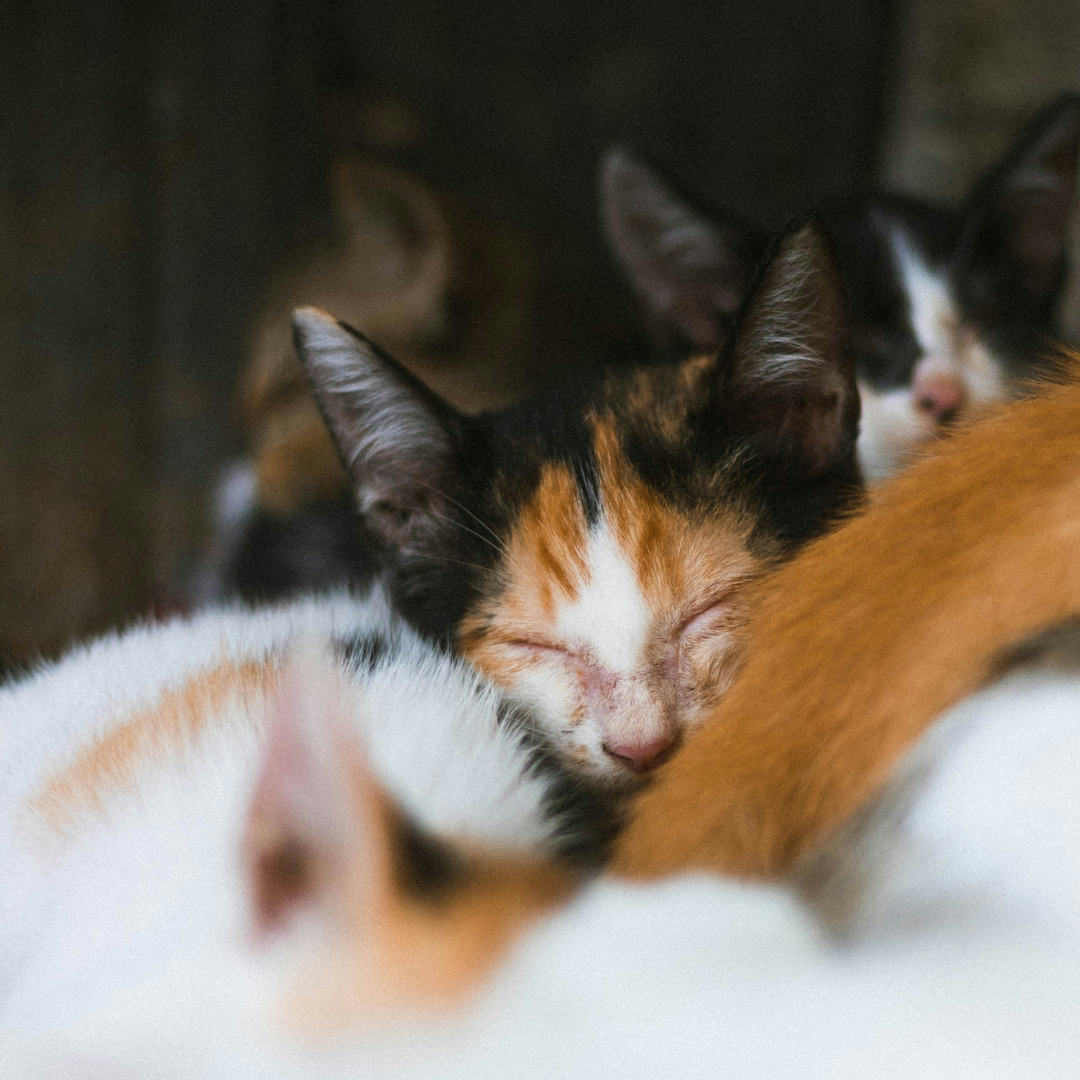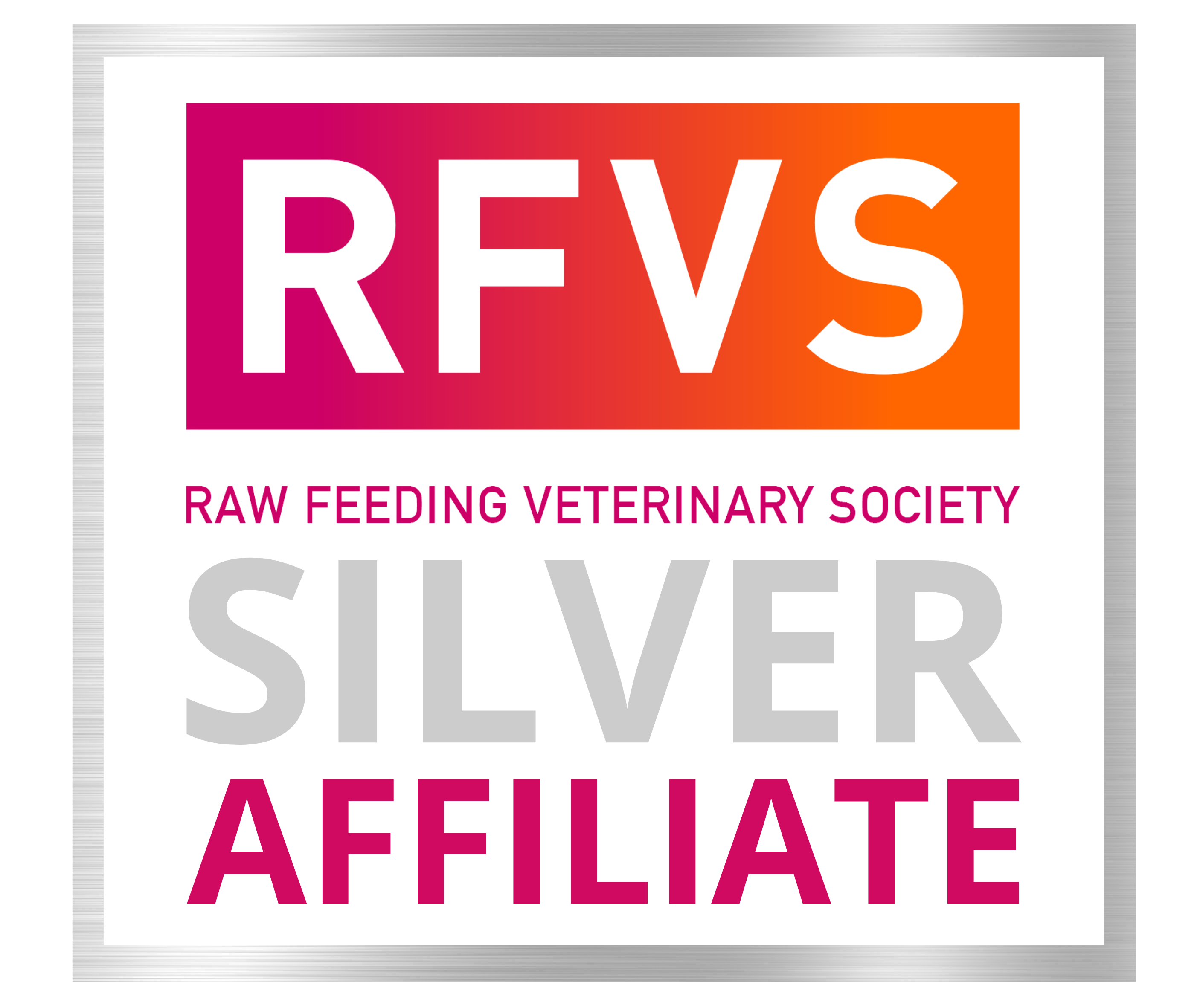Cats, Diet & Disease

CATS ARE STRICT CARNIVORES
Cats evolved to eat small prey animals. They cannot utilise plant proteins to satisfy their nutrient requirements. Wild cats eat a meat-based diet: high protein, moderate fat, minimal carbohydrate and a high moisture content.
Most domestic cats are fed commercial dry food, often high in plant proteins (corn, wheat and soy) because they are cheaper than animal proteins. The average dry food for cats is extremely high in carbohydrate (35-50%) because it contains grains or vegetables. Synthetic nutrients are added to the manufactured diet to replace those missing, or lost due to processing - hence the long list of ingredients.
Cats evolved to obtain most of their water from their food. A cat on dry food may not drink adequate water to make up for the dehydrated food. Raw food contains good moisture levels which helps keep the cat well hydrated.
A raw diet may be helpful for many diseases, however, it is very important that unwell cats are not transitioned onto a raw diet without close consultation with your veterinarian.
LINKS BETWEEN INAPPROPRIATE DIET & DISEASES
DIABETES
When a cat eats carbohydrates the pancreas responds by producing insulin. Carbohydrates are broken down into sugar (glucose) molecules and enter the bloodstream. Insulin transports sugar out of the blood and into cells where it can be metabolised. This is a critical process because high blood sugar is dangerous.
Throughout evolution, cats have consumed an extremely low carbohydrate diet, so their pancreas has not had to produce much insulin to deal with the sugar. On modern processed diets cats are ingesting an unprecedented amount of carbohydrate, leading to a greatly increased workload on the pancreas. It is not surprising that diabetes (when a damaged pancreas fails to produce insulin) is now a common condition in cats. Obesity also predisposes to diabetes. A species-appropriate raw diet is extremely low in carbohydrates and promotes a healthy body weight.
URINARY TRACT DISEASE
Feline Lower Urinary Tract Disease (FLUTD) is commonly diagnosed in cats; frequently involving bladder inflammation (cystitis) and crystals, and less commonly bladder stones and infection. Symptoms include blood in the urine, frequent squatting, and pain when urinating. In males, the urinary tract may fully block, which is acutely life threatening.
The conditions that favour the development of FLUTD include:
· Chronic dehydration: Adequate hydration is important to flush the urinary system and maintain urinary tract health. When cats fail to consume adequate fluid their urine becomes too concentrated which can irritate the bladder wall, potentially leading to inflammation, crystals and stones. Cats have a biological expectation that their diet will be high in moisture. A species-appropriate diet has excellent moisture levels.
· High Fibre: It makes little sense to feed a high fibre diet to a carnivore. Plant fibre draws water into the colon, which may compound dehydration. A raw diet contains little or no plant fibre but is rich in the appropriate carnivore dietary equivalents of fibre – joints, tendons, skin etc.
· Carbohydrates: Grains and starches in a processed diet can cause the urine to become more alkaline (high pH) which in turn may lead to the formation of crystals (usually struvite). A well-planned raw diet promotes the ideal urine acidity (pH 6-6.5).
· Anxiety: Anxiety can also cause alkaline urine. A raw diet, supporting good gut health, may affect positive behavioural changes.
INFLAMMATORY BOWEL DISEASE
Inflammatory Bowel Disease (IBD) involves chronic, uncontrolled inflammation in the gut. In humans, IBD presents as Crohn’s Disease and Ulcerative Colitis. In cats, we see gastritis, enteritis and colitis.
Grumpy cats with swollen tummies and bouts of vomiting, diarrhoea and occasionally constipation, could be suffering from IBD. A cat with IBD may only display subtle symptoms, such as intermittent vomiting. It’s not normal for a cat to vomit regularly. Symptoms may be missed in outdoor cats because we usually don’t see their stool.
IBD has multiple causes. Cats can have a genetic susceptibility to IBD but the disease may or may not develop depending on environmental factors. The interaction between diet, lifestyle, microbiome, and the immune system is central in the development of IBD.
A healthy gut is a source of nourishment, absorbing beneficial nutrients but not toxins. An inflamed gut becomes “leaky” (increased intestinal permeability) and functions poorly, leading to the absorption of toxins and the loss of nutrients.
A balanced microbiome is vital for a well functioning immune system and optimal health. IBD occurs in conjunction with microbial dysbiosis (an imbalance of the microbiome).
A leaky gut, along with dysbiosis, can set a cat up for a host of other health issues.
The gut has great capacity for repair when fed a species-appropriate raw food diet, which can work wonders for addressing the symptoms of increased intestinal permeability and dysbiosis.
OBESITY
We have an epidemic of overweight cats. This is not seen in wild cats on their natural diet. It is a consequence of a shift to highly palatable diets with inappropriate ingredients. High carbohydrate diets can promote weight gain.
Too many fat cells can cause chronic inflammation, hormonal imbalances, cancer, diabetes and many other conditions.
Processed weight-loss diets are low in fat, and focus on calorie restriction. This often leaves cats perpetually hungry. A well planned raw diet is not calorie restricted, high-carbohydrate, or low-fat, but cats are less inclined to overeat because it meets their protein needs and offers satiety.
Cats maintain a healthy weight and good musculature happily and more easily on a species-appropriate raw meaty bones diet.
DENTAL DISEASE
Dental disease is a huge part of daily veterinary practise. Aside from pain, poor oral health provides a nidus of infection which will affect gut health and can spread in the bloodstream to damage organs, such as the kidneys and the heart.
Optimal dental health relies on a balanced oral microbiome, and mechanical teeth cleaning. When carnivorous jaws shear and tear at appropriate raw meaty bones and chunks of meat, teeth and gums are kept clean and healthy.
CHRONIC KIDNEY INSUFFICIENCY
Kidney (renal) disease is very common in older cats. There are many potential causes.
Inorganic phosphorus added to commercial diets can be a factor. Cats are unable to adequately regulate absorption of inorganic phosphorus, which may lead to excessive levels in the blood. Natural phosphorus in a raw diet is absorbed and regulated by the gut.
Good moisture content in the diet will support kidney health.
A well-planned raw diet provides optimal levels of high quality, easily digestible protein; plenty of essential fatty acids and B vitamins; and an appropriate calcium to phosphorus ratio.
We successfully manage many kidney cats on a raw diet (though it may not be suitable in every case).
HYPERTHYROID
The thyroid gland may become overactive in older cats. There are many possible causes for this including variable iodine contents of foods, and environmental chemicals.
A well planned raw diet does not contain high levels of iodine
PREVENTION IS THE BEST CURE
Preventive nutrition is the key to keeping your cat healthy.
There are many positive reasons to consider a raw diet for your pet - the best place to get started is to head into a Raw Essentials store or start online. If your pet has health concerns (i.e. they are under direct veterinary care, on a prescription food, or on medication) our veterinary support helpline will assist in the planning.

